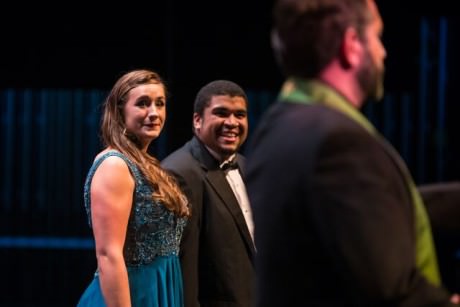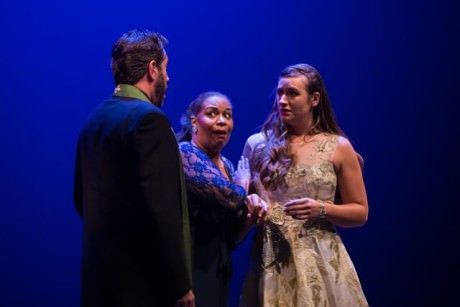Boy meets Girl. Girl meets Boy. They fall in love – at first sight – in spite of the enmity between their warring families, the Capulets and the Montagues. This timeless, tragic love story, penned centuries ago by William Shakespeare, received perhaps its most famous operatic setting in Charles Gounod’s 19th century opera, Roméo et Juliette.

With minimal, yet elegant costuming and staging by Director Jay D. Brock, The Maryland Lyric Opera’s (MDLO) current production uses the sublime beauty of its singers’ voices to breathe fresh life into one of the most famous love stories ever written. True to its commitment to showcase the beauty of the human voice, the MDLO’s production of Roméo et Juliette features some of the most glorious singing I’ve heard in a long time.
As Juliette, lyric coloratura soprano Merideth Marano’s voice was a constant thrill throughout the evening, including the famous aria “Je veux vivre” and the “Potion Aria”, “Dieu! Quel frisson court dans les veines.” Ms. Marano sparkled in her high notes, but brought special poignancy and soulfulness to her lower notes as well. She also brought considerable acting skills to bear in the emotional scenes between Juliette and Roméo from her balcony, and in the tomb where she was laid to rest.
Lyrical doesn’t begin to capture to sublime beauty and suppleness of tenor Chaz’men Williams-Ali’s voice as Roméo. Soaring throughout the Kay Theatre in almost every scene of the opera, Mr. Williams-Ali’s voice was a revelation throughout the evening, as in the tender duet “O nuit divine” with Juliette near her bedroom balcony, or in the deeply emotional duet of love and forgiveness with Juliette “Va! Je t’ai pardonné,” Mr. Williams-Ali gorgeously conveyed every emotion Roméo experienced with his voice.
Also worthy of mention are the singers in supporting roles in the opera – Anamer Castrello provided a rich mezzo soprano voice and delightful comic relief as Juliette’s nurse Gertrude.
Phillip Bullock’s supple baritone voice was alternatively playful, authoritative, and threatening as Grégorio, one of the Capulet servants with an eye for Gertrude.
Guido LeBrón brought gravitas and a deeply resonant baritone voice to Capulet, Juliette’s father. And mezzo soprano Augusta Caso was spectacular in the trouser role of Stéphano, thrilling with vocal pyrotechnics in her brief, but memorable appearance.
A special treat for me came in Act III, during the street fight scene between the Capulets and Montagues, where Tybalt (a Capulet and Juliette’s cousin) squares off against Mercutio (a Montague and Roméo’s good friend). The singing by tenor Patrick Cook (Tybalt) and baritone Thomas Gunther (Mercutio) was wonderful in the aria “Mab, la reine des mensonges.” But the thing I enjoyed most about this scene was the hat tip to the most famous non-operatic adaptation of this Shakespeare tragedy, West Side Story. Choreographed by Ryan Sellers, this street fight scene is reminiscent of the Sharks and the Jets, complete with fighters who substitute for Tybalt and Mercutio in perhaps the most creatively staged moment of the evening. It was nicely done, and a great way to pay homage to another fantastic variation on this classic love story.
The MDLO’s chorus for Roméo et Juliette was outstanding from start to finish. Even while offstage, their sound was resplendent, filled with rich, sonorous tones that were pleasing to the ear and filling to the soul. Likewise, the orchestra, conducted by Glenn Quader, provided superb support to the production throughout the performance, setting the stage for every scene, and setting the mood perfectly for the entire evening.

The MDLO production of Roméo et Juliette is double cast, with Saturday evening’s performance featuring the first cast. The singing was so uniformly wonderful that I have no doubt the audiences seeing the performance of the second cast will be equally thrilled.
If you are a fan of lushly beautiful opera singing, along with a marvelous orchestra, all wrapped around a classic Shakespearean love story, I strongly urge you to catch one of the last 2 performances of Roméo et Juliette this coming weekend. You definitely will not be disappointed.
Roméo et Juliette is sung in French with English subtitles, translated by Henriette Lund, the Maryland Lyric Opera’s General Artistic Director.
Running time: Approximately 3 hours, with one 15-minute intermission.
Roméo et Juliette has two more performances on Friday, July 24th and Sunday, July 26, 2015 at at the Clarice’s Kay Theatre – Stadium Drive and Route 193, in College Park, MD. For tickets, call (301) 405.2787, or purchase them online.




